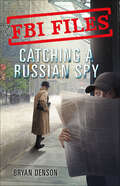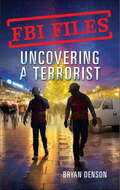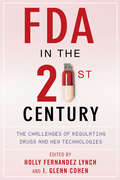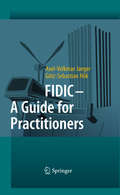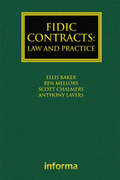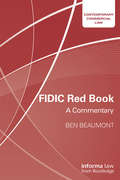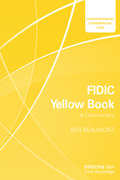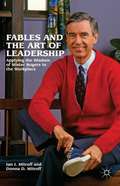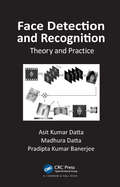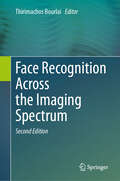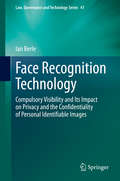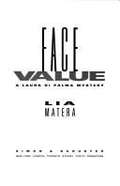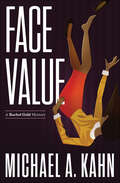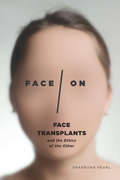- Table View
- List View
FBI Files: Agent Leslie G. Wiser Jr. and the Case of Aldrich Ames (FBI Files #2)
by Bryan DensonCatching a Russian Spy is the story of the FBI's investigation of Aldrich Ames, CIA agent who turned Russian spy, and the agent who helped bring him to justice.Aldrich H. "Rick" Ames was a 31-year veteran of the CIA. He was also a Russian spy. By the time Ames was arrested in 1994, he had betrayed the identities of dozens and caused the deaths of ten agents. The notorious KGB (and later the Russian intelligence service, SVR) paid him millions of dollars. Agent Leslie G. “Les” Wiser, Jr. ran the FBI's Nightmover investigation tasked with uncovering a mole in the CIA. The team worked night and day to collect evidence—sneaking into Ames' home, hiding a homing beacon in his Jaguar, and installing a video camera above his desk. But the spy kept one step ahead, even after agents followed him to Bogota, Colombia. In a crazy twist, the FBI would score its biggest clue from inside Ames' garbage can.At the time of his arrest on February 21, 1994, he had compromised more highly-classified CIA assets than any other agent in history. Go behind the scences of some of the FBI's most interesting cases in award-winning journalist Bryan Denson's FBI Files series, featuring the investigations of the Unabomber, al-Qaeda member Mohamed Mohamud, and Michael Young's diamong theft ring. Each book includes photographs, a glossary, a note from the author, and other detailed backmatter on the subject of the investigation.
FBI Files: Agent Ryan Dwyer and the Case of the Portland Bomb Plot (FBI Files #3)
by Bryan DensonUncovering a Terrorist is the story of the FBI's investigation of Mohamed Mohamud led by Agent Ryan Dwyer, the agent who helped bring him to justice, creating room for the conversation surrounding religious terrorism and its effects around the world.Mohamed Osman Mohamud was an American citizen, a college student at Oregon State University, and a wannabe terrorist. His dream was to go to Yemen, train with al-Qaeda, and travel to Afghanistan to kill U.S. soldiers. But first, he plotted to detonate a massive bomb at a Christmas tree lighting ceremony in downtown Portland.Agent Ryan Dwyer ran the sting operation to see how serious Mohamed was. He and an Arabic-speaking partner, joined by FBI personnel—including two undercover operatives posing as al-Qaeda terrorists—worked month after month to get to know him and keep the people of Portland safe.Go behind the scences of some of the FBI's most interesting cases in award-winning journalist Bryan Denson's FBI Files series, featuring the investigations of the Unabomber, Russian spy Rick Ames, and Michael Young's diamong theft ring. Each book includes photographs, a glossary, a note from the author, and other detailed backmatter on the subject of the investigation.
FBI Handbook of Crime Scene Forensics: The Authoritative Guide to Navigating Crime Scenes
by Federal Bureau of Investigation Federal Bureau of Investigation Jacqueline FishGuidance and procedures for safe and efficient methods from the FBI’s Laboratory Division and Operational Technology Division. The FBI Handbook of Crime Scene Forensics is the official procedural guide for law enforcement agencies, attorneys, and tribunals who wish to submit evidence to the FBI’s Laboratory and Investigative Technology Divisions. This book outlines the proper methods for investigating crime scenes, examining evidence, packing and shipping evidence to the FBI, and observing safety protocol at crime scenes. Types of evidence discussed include: Bullet jacket alloys Computers Hairs Inks Lubricants Ropes Safe insulations Shoe prints Tire treads Weapons of mass destruction Particular attention is paid to recording the appearance of crime scenes through narratives, photographs, videos, audiotapes, or sketches. A guide for professional forensics experts and an introduction for laymen, the FBI Handbook of Crime Scene Forensics makes fascinating reading for anyone with an interest in investigative police work and the criminal justice system.
FDA in the Twenty-First Century: The Challenges of Regulating Drugs and New Technologies
by Cohen Lynch Holly Fernandez I. GlennIn its decades-long effort to assure the safety, efficacy, and security of medicines and other products, the Food and Drug Administration has struggled with issues of funding, proper associations with industry, and the balance between consumer choice and consumer protection. Today, these challenges are compounded by the pressures of globalization, the introduction of novel technologies, and fast-evolving threats to public health. With essays by leading scholars and government and private-industry experts, FDA in the Twenty-First Century addresses perennial and new problems and the improvements the agency can make to better serve the public good.The collection features essays on effective regulation in an era of globalization, consumer empowerment, and comparative effectiveness, as well as questions of data transparency, conflicts of interest, industry responsibility, and innovation policy, all with an emphasis on pharmaceuticals. The book also intervenes in the debate over off-label drug marketing and the proper role of the FDA before and after a drug goes on the market. Dealing honestly and thoroughly with the FDA's successes and failures, these essays rethink the structure, function, and future of the agency and the effect policy innovations may have on regulatory institutions abroad.
FDR Drive (Nora Carleton)
by James ComeyIn a new legal thriller by the former director of the FBI, federal prosecutor Nora Carleton and legendary investigator Benny Dugan confront a deadly sect of political extremists. After a stint in the private sector, working at the largest hedge fund in the world, Nora Carleton has returned to her former role as a New York City federal prosecutor. And she’s arrived just in time to face one of the most dangerous domestic terror attacks in the history of the city. A threat is building in the city, with far right extremism powered by internet demagogues and funded by shadowy organizations. Together with legendary investigator Benny Dugan and aided by colleagues at the FBI, Nora builds a case against one of the key players in this burgeoning movement, arguing before a jury that some speech is actually a deadly crime. But the menace taking root is far bigger than any courtroom, and as the militants target an upcoming United Nations rally, Nora and her team must race to disrupt the plans and minimize casualties. At once a fast-paced legal thriller and a close look at the very real perils of political extremism, FDR Drive harnesses former FBI director James Comey’s life experience to tell an authentic and compelling narrative that readers won’t soon forget.
FDR and Civil Aviation
by Alan P. DobsonThe aim of this study is to demonstrate that Franklin D. Roosevelt was one of the leading agents in both setting out and working to implement the principles that came to govern the international aviation system from 1945 down to the recent present and that much of its design was drawn from the experience of domestic US aviation reform in the 1930s. In contemporary parlance one might say that what is proposed here is the explanation of the genesis of a roadmap set out successively by Roosevelt's administrations for the achievement of a liberalized and lightly regulated international civil aviation market. Furthermore, a key contention of this research is that FDR himself played a much more important role in crafting policy than has previously been acknowledged.
FDR and the Spanish Civil War: Neutrality and Commitment in the Struggle that Divided America
by Dominic TierneyWhat was the relationship between President Franklin D. Roosevelt, architect of America's rise to global power, and the 1936-39 Spanish Civil War, which inspired passion and sacrifice, and shaped the road to world war? While many historians have portrayed the Spanish Civil War as one of Roosevelt's most isolationist episodes, Dominic Tierney argues that it marked the president's first attempt to challenge fascist aggression in Europe. Drawing on newly discovered archival documents, Tierney describes the evolution of Roosevelt's thinking about the Spanish Civil War in relation to America's broader geopolitical interests, as well as the fierce controversy in the United States over Spanish policy. Between 1936 and 1939, Roosevelt's perceptions of the Spanish Civil War were transformed. Initially indifferent toward which side won, FDR became an increasingly committed supporter of the leftist government. He believed that German and Italian intervention in Spain was part of a broader program of fascist aggression, and he worried that the Spanish Civil War would inspire fascist revolutions in Latin America. In response, Roosevelt tried to send food to Spain as well as illegal covert aid to the Spanish government, and to mediate a compromise solution to the civil war. However unsuccessful these initiatives proved in the end, they represented an important stage in Roosevelt's emerging strategy to aid democracy in Europe.
FIDIC - A Guide for Practitioners
by Axel-Volkmar Jaeger Götz-Sebastian HökThis book provides an introduction to the 1999 FIDIC forms of contract including the FIDIC Red Book, the FIDIC Yellow Book, the FIDIC Silver Book and the new 2008 FIDIC Gold Book. Consulting engineers, architects and employers will also find reliable information about the FIDIC White Book. The authors explain the meaning of terms and features which are used by FIDIC. In particular the authors attempt to explain the English legal wording in its original legal context for use in civil law countries. Common law practitioners will find useful advice on civil law features and concepts which affect the use of FIDIC contracts in civil law countries. The book covers pre-contractual and contractual issues and the management of FIDIC contracts and offers support in interpreting and understanding the contract terms and contract procedures as to variations, tests, payment certificates, taking-over cases, claims and dispute resolution features. It includes flow charts, glossaries, checklists and sample letters. Common law practitioners will also find helpful information on civil law jurisdictions and civil law concepts.
FIDIC Contracts in Africa and the Middle East: A Practical Guide to Application (Practical Legal Guides for Construction and Technology Projects)
by Donald CharrettFIDIC contracts are the most widely used contracts for international construction around the world and are used in many different jurisdictions, both common law and civil law. For any construction project, the General Conditions of Contract published by FIDIC need to be supplemented by Particular Conditions that specify the specific requirements of that project. FIDIC Contracts in Africa and the Middle East: A Practical Guide to Application provides readers with detailed guidance and resources for the preparation of the Particular Conditions that will comply with the requirements of the laws that apply to the site where the work is carried out, and for the governing law of the contract, for a number of the jurisdictions in which FIDIC contracts are or can be used. This book closely follows the format of The International Application of FIDIC Contracts. Each jurisdiction features an outline of its construction industry and information on the impact of COVID-19 on both the execution and operation of construction contracts. This book is essential reading for construction professionals, lawyers and students of construction law.
FIDIC Contracts in Asia Pacific: A Practical Guide to Application (Practical Legal Guides for Construction and Technology Projects)
by Donald CharrettFIDIC contracts are the most widely used contracts for international construction around the world and are used in many different jurisdictions, both common law and civil law. For any construction project, the General Conditions of Contract published by FIDIC need to be supplemented by Particular Conditions that specify the specific requirements of that project subject to the relevant laws. FIDIC Contracts in Asia Pacific provides readers with detailed guidance and resources for the preparation of the Particular Conditions that will comply with the requirements of the applicable laws for a number of the jurisdictions in which FIDIC contracts are used. The laws that apply to the governing law of the contract, construction works and dispute resolution in each jurisdiction are identified. This book offers chapters on the FIDIC Conditions of Contract for Underground Works, and the perspective of a bilateral aid agency on the use of FIDIC contracts. Each jurisdiction features an outline of its construction industry and information on the impact of Covid-19 on both the execution of construction projects and the operation of construction contracts. This book is essential reading for construction professionals, lawyers and students of construction law using FIDIC contracts.
FIDIC Contracts in Europe: A Practical Guide to Application (Practical Legal Guides for Construction and Technology Projects)
by Donald CharrettFIDIC contracts are the most widely used contracts for international construction around the world and are used in many different jurisdictions, both common law and civil law. For any construction project, the General Conditions of Contract published by FIDIC need to be supplemented by Particular Conditions that specify the specific requirements of that project. FIDIC Contracts in Europe: A Practical Guide to Application provides readers with detailed guidance and resources for the preparation of the Particular Conditions that will comply with the requirements of the applicable laws that apply to the site where the work is carried out, and for the governing law of the contract, for a number of the jurisdictions in which FIDIC contracts are used. This book closely follows the format of The International Application of FIDIC Contracts, with the addition of an outline of the construction industry and information on the impact of COVID-19 on both the execution and operation of construction contracts in each jurisdiction. This book is essential reading for construction professionals, lawyers and students of construction law.
FIDIC Contracts in the Americas: A Practical Guide to Application (Practical Legal Guides for Construction and Technology Projects)
by Donald CharrettFIDIC contracts are the most widely used contracts for international construction around the world and are used in many different jurisdictions, both common law and civil law. For any construction project, the General Conditions of Contract published by FIDIC may need to be supplemented by Particular Conditions that specify the specific requirements of that project and jurisdiction. FIDIC Contracts in the Americas: A Practical Guide to Application provides readers with an overview of the legal environment, the construction industry and features of contract law applying to construction contracts in a number of jurisdictions in the Americas. It provides detailed guidance for the preparation of the Particular Conditions for FIDIC contracts that will comply with the requirements of the applicable laws that apply to the site where the work is carried out, and for the governing law of the contract. This book also details the impact of COVID-19 on both the execution of construction projects and the operation of construction contracts in each jurisdiction. This book is essential reading for construction professionals, lawyers and students of construction law.
FIDIC Contracts: Law and Practice (Construction Practice Series)
by Ellis Baker Ben Mellors Scott Chalmers Anthony LaversFIDIC Contracts: Law and Practice is sure to become the leading industry standard guide to using the FIDIC forms, and is the only book to date which deals with the whole suites of contracts, including the new gold book for Design, Build and Operate projects. The White & Case work is outstanding in its detailed consideration and treatment of the legal aspects of the interpretation and application of the Conditions, touching on many points that most people would not have encountered. Humphrey LLoyd, International Construction Law Review [2010] ICLR 386
FIDIC Plant and Design-Build Form of Contract Illustrated
by Raveed Khanlari Mahdi Saadat FardThe Conditions of Contract prepared by FIDIC are used extensively as the standard contract of choice in international construction and civil engineering projects. Engineers working on these projects need to be aware of these contracts, but as the forms are complex it can be difficult to draw together all the sub-clauses relating to a particular issue.The FIDIC Plant and Design-Build Forms of Contract Illustrated crystallizes the requirements of the FIDIC P&DB contract into a range of simple to follow flow charts, providing a clear and concise way to rapidly assimilate the requirements of each clause. The relationship between the various clauses in the contract, the concepts, process methods and actors involved in each sub-clause are all easily seen, and key issues around each topic (such as periods allowed, notices, etc) are all documented. In addition, related sub-clauses and/or important additional documents are linked so that the reader has a full understanding of the wider implications of each clause.
FIDIC Red Book: A Commentary (Contemporary Commercial Law)
by Ben BeaumontWritten by a member of the FIDIC President’s List of Adjudicators, this detailed and critical commentary on the FIDIC Red Book provides authoritative guidance and recommendations for best practice. Focusing on each Clause of the Condition of Contract, this book identifies pitfalls and logistics issues associated with its enforcement and ancillary processes, to give readers an advantage when operating with the FIDIC Red Book. Intended to promote the best use and growth of FIDIC, this guide will be essential for all users of the FIDIC Red Book, be they contractors, lawyers, engineers, students training to join these industries or any professional involved in the resolution of disputes involving the FIDIC Red Book.
FIDIC Yellow Book: A Commentary (Contemporary Commercial Law)
by Ben BeaumontThe book analyses every aspect of the ease or otherwise of implementing the FIDIC Yellow Book Conditions of Contract. On a clause-by-clause basis, it highlights important structural features and suggests alternative text to avoid problems with the contract. Written in a user-friendly manner by an expert user of the FIDIC Suite of Contracts, who is a Member of the FIDIC President’s List of Adjudicators, this book will be a vital reference point for contractors, lawyers, engineers, arbitrators and all others concerned with the FIDIC contracts.
Fables and the Art of Leadership
by Ian I. Mitroff Donna D. MitroffFred Rogers is one of the great icons of American culture and the values and philosophy for which he is famous have stood the test of time. Fables and the Art of Leadership brings those same values and philosophy to the workplace, where they're now needed more than ever. This unique and timely work is for everyone who aspires to become and be a better leader. Mister Rogers didn't expound abstract principles to help children face up to the problems they faced; instead, he created and told countless fables and stories. Ian and Donna Mitroff's book uses those fables to help managers master the most difficult challenges they face: achieving significant change; fostering creativity; curbing rudeness; promoting leadership, managing crises, and many more. It is their new interpretations for the workplace that will make Fables and the Art of Leadership a classic in business studies.
Face Detection and Recognition: Theory and Practice
by Asit Kumar Datta Madhura Datta Pradipta Kumar BanerjeeFace detection and recognition are the nonintrusive biometrics of choice in many security applications. Examples of their use include border control, driver's license issuance, law enforcement investigations, and physical access control.Face Detection and Recognition: Theory and Practice elaborates on and explains the theory and practice of face de
Face Recognition Across the Imaging Spectrum
by Thirimachos BourlaiEmbark on a journey through the recent groundbreaking developments in face recognition (FR) systems with our second edition. Initially designed for controlled conditions, FR systems have evolved to conquer real-world challenges, adapting to low-light scenarios and extended distances. Our book delves into the transformation brought about by advancements in imaging sensors and cost-effective infrared (IR) cameras, exploring intensified near-infrared (NIR), shortwave IR (SWIR), middle-wave IR (MWIR), and long-wave IR (LWIR) imagery. This edition caters to the burgeoning interest in FR technologies, aligning with recent strides in computer vision, pattern recognition, and biometric analysis. Tailored for biometrics researchers, practitioners, and students, it addresses the critical need for FR algorithms in operational environments. Our book encompasses three comprehensive sections: (a) Face Recognition and Biometric Systems: Dive into topics such as face profile, facial attractiveness, periocular and binocular recognition, and quality training for face-based examinations. (b) Biometric System Security and Attacks: Explore adversarial attacks, domain transformers, demographic fairness, ocular pathologies, and distance-based classification of biometric images. (c) Biometric Image Synthesis and Technology Enhancements:Uncover the secrets of face image synthesis, thermal band head pose estimation, facial image analysis in forensic examination, and optimal computer monitor configurations. With 13 meticulously crafted chapters, this edition provides updated insights, experimental findings, and a roadmap for the future. Each chapter delivers a rich exploration of its specific topic, weaving together background information, literature reviews, methodologies, experiments, and concluding with challenges and future directions. Elevate your understanding of evolving face recognition technologies – the future awaits!
Face Recognition Technologies: Designing Systems that Protect Privacy and Prevent Bias
by Douglas Yeung Rebecca Balebako Carlos Ignacio Gutierrez Gaviria Michael ChaykowskyFace recognition technologies (FRTs) have many practical security-related purposes, but advocacy groups and individuals have expressed apprehensions about their use. This report highlights the high-level privacy and bias implications of FRT systems. The authors propose a heuristic with two dimensions -- consent status and comparison type -- to help determine a proposed FRT's level of privacy and accuracy. They also identify privacy and bias concerns.
Face Recognition Technology: Compulsory Visibility and Its Impact on Privacy and the Confidentiality of Personal Identifiable Images (Law, Governance and Technology Series #41)
by Ian BerleThis book examines how face recognition technology is affecting privacy and confidentiality in an era of enhanced surveillance. Further, it offers a new approach to the complex issues of privacy and confidentiality, by drawing on Joseph K in Kafka’s disturbing novel The Trial, and on Isaiah Berlin’s notion of liberty and freedom. Taking into consideration rights and wrongs, protection from harm associated with compulsory visibility, and the need for effective data protection law, the author promotes ethical practices by reinterpreting privacy as a property right. To protect this right, the author advocates the licensing of personal identifiable images where appropriate.The book reviews American, UK and European case law concerning privacy and confidentiality, the effect each case has had on the developing jurisprudence, and the ethical issues involved. As such, it offers a valuable resource for students of ethico-legal fields, professionals specialising in image rights law, policy-makers, and liberty advocates and activists.
Face Value (Laura DiPalma Mystery #4)
by Lia MateraLaura hangs out her shingle. She's ready to take any case, even a woman who claims that her New Age guru videotapes group sex sessions for therapeutic reasons-- tapes that wind up at the local porno parlors. Laura's investigation takes her from a private fantasy island to kinky sex club back rooms to corporate boardrooms.
Face Value: A Rachel Gold Mystery (Attorney Rachel Gold Mysteries #9)
by Michael A. Kahn"A deft historical novel...and window into a too-often ignored chapter in recent american history."—S. J. Rozan, Edgar award-winning author of Ghost HeroIn December 1941, America reels from the attack on Pearl Harbor. Patriotism and paranoia grip New York as the city frantically mobilizes for war. Nurse Louise Hunter is outraged when the FBI, in a midnight sweep of prominent Japanese residents, arrests her patient's wife. Masako Fumi is an avant-garde artist, a newcomer to the bustling city. The nurse vows to help free Masako.When the body of Masako's art dealer is discovered in the gallery where he'd been closing down her controversial show, Masako's troubles multiply. Homicide detective Michael McKenna doubts her guilt, but an ambitious G-man schemes to turn the murder and ensuing espionage accusations into a political cause célèbre.Louise hires a radical lawyer and enlists the help of her journalist roommate. But sensing a career-making story, Cabby Ward sets out to exploit Masako's dilemma for her own gain. Louise and McKenna must defy both racism and ham-fisted government agents to expose the real killer.
Face of Betrayal (Triple Threat #1)
by April Henry Lis WiehlWhile home on Christmas break, a seventeen-year-old Senate page takes her dog out for a walk and never returns. Reporter Cassidy Shaw is the first to break the story. The resulting media firestorm quickly ensnares Federal Prosecutor Allison Pierce and FBI Special Agent Nicole Hedges. The three unique women are life-long friends who call themselves The Triple Threat--a name derived from their favorite dessert and their uncanny ability to crack cases via their three positions of power. Though authorities think Katie might have been kidnapped or run away, those theories shatter when Nicole uncovers Katie's blog. They reveal a girl troubled by a mysterious relationship with an older man. Possibly a U.S. Senator. As the three women race against time to find Katie alive, their increasing emotional involvement brings out their own inner demons and external enemies. There are many faces of betrayal, but they must find the one face in a crowd of growing suspects before they become the next victims. In FACE OF BETRAYAL, Lis Wiehl's expertise in law, politics, and criminal investigation merges with April Henry's narrative genius to create a gripping mystery filled with rich characters, real danger, and a shocking yet satisfying final twist.
Face/On: Face Transplants and the Ethics of the Other
by Sharrona PearlAre our identities attached to our faces? If so, what happens when the face connected to the self is gone forever—or replaced? In Face/On, Sharrona Pearl investigates the stakes for changing the face–and the changing stakes for the face—in both contemporary society and the sciences. The first comprehensive cultural study of face transplant surgery, Face/On reveals our true relationships to faces and facelessness, explains the significance we place on facial manipulation, and decodes how we understand loss, reconstruction, and transplantation of the face. To achieve this, Pearl draws on a vast array of sources: bioethical and medical reports, newspaper and television coverage, performances by pop culture icons, hospital records, personal interviews, films, and military files. She argues that we are on the cusp of a new ethics, in an opportune moment for reframing essentialist ideas about appearance in favor of a more expansive form of interpersonal interaction. Accessibly written and respectfully illustrated, Face/On offers a new perspective on face transplant surgery as a way to consider the self and its representation as constantly present and evolving. Highly interdisciplinary, this study will appeal to anyone wishing to know more about critical interventions into recent medicine, makeover culture, and the beauty industry.
